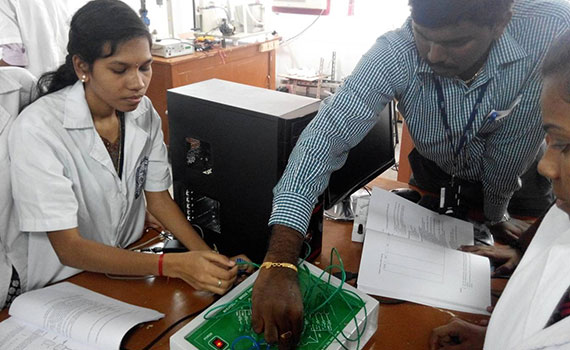

The Electronics and Instrumentation Engineering in Thangavelu Engineering College was established in the year 2000. The department is equipped with eminent faculty members specialized in different areas including Process Control & Instrumentation, Medical Electronics, Power Electronics, Applied Electronics, VLSI design, Instrumentation Engineering etc., The department has well established laboratories namely Virtual Instrumentation Laboratory, Transducers and Measurements Laboratory, Electronics Laboratory with good infrastructure and state of the art instruments.
Moulding High Quality Professionals and to bring out qualitative citizens through Value Based Education and professional trainings. This includes providing in-depth knowledge in multidisciplinary and integrated education for meeting the technological advancements in Electronics and Instrumentation Engineering.
To prepare the students for employment in various instrumentation related areas and for pursuing higher education by educating them in fundamental concepts, laboratory and field techniques.
To prepare the students to be dynamic, diligent and to create the awareness for lifelong learning needed for a successful professional career.
The B.E. - Electronics & Instrumentation Engineering was started in the year 2000. This course was introduced as there is an increase in demand in the field of Electronics and Instrumentation Engineering and E&I is a complete blend of technical subjects involving both Electronics and Instrumentation fields imparting adequate knowledge and expertise. With the advancement and widespread applications of electronics and computer in instrumentation and control, the syllabus is framed to include core courses of electronics, instrumentation as well as computer engineering taken into consideration.

The responsibilities of Electronics and Instrumentation Engineers will be with the design, construction and maintenance of instruments and entire instrumentation systems of any industrial undertaking. After completion of this course, students will have very high opportunity in almost all Automation industries, processing industries, chemical industries, bio-medical instrumentation , power plants, Fertilizers & Chemical industries, Petrochemical industries, Navigational & Aerospace Organization, Food Processing Industry, Weather Stations etc.,
An instrumentation engineer supports control-system engineering activities by designing, developing, installing and testing a company's electrical and instrumentation systems. The main focus of E&I engineers will be in the field of Control systems design , Process control and instrumentation, Electronics design and manufacturing ,Engineering research and development, Sales and service of technical equipment, Project and technology management etc.,
The challenges involved in studying Instrumentation Engineering (such as problem solving, having a design focus utilizing technology to benefit society, etc) and skills (such as project management, communication, technical, analytical, team membership, leadership skills etc) needed to perform the job as Instrumentation Engineer.
PEO 1: To prepare the students have successful career in industry and to provide an opportunity to work in inter disciplinary groups.
PEO 2: To provide strong foundation in basic science and mathematics necessary to formulate, solve and analyze Electronics and Instrumentation problems in various Instrumentation fields.
PEO 3: To promote students awareness for lifelong learning and professional ethics to motivate for higher studies and provide good knowledge in instrumentation systems and their applications.
1. Ability to understand and apply differential equations, integrals, matrix theory, probability theory and Laplace, Fourier and Z transformations for engineering problems
2. Ability to understand and apply basic science, circuit theory, control theory and signal processing concepts to engineering problems.
3. Ability to model and analyze transducers.
4. Ability to understand and analyze Instrumentation systems and their applications to various industries.
5. Ability to understand and analyse process control engineering problems.
6. Ability to understand and analyse, linear and digital electronic circuits.
7. Ability to review, prepare and present technological developments.
8. Ability to form a group and develop or solve engineering hardware and problems.
9. To understand and apply computing platform and software for engineering problems.
10. To understand ethical issues environmental impact and acquire management skills.
List of Labs: